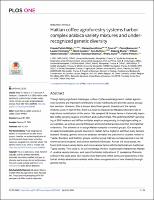| dc.contributor.author | Millet, Claude Patrick. | |
| dc.contributor.author | Solano Sánchez, William | |
| dc.contributor.author | Alliane, Clementine | |
| dc.contributor.author | Tram Vi | |
| dc.contributor.author | Marraccini, Pierre | |
| dc.date.accessioned | 2024-06-28T20:16:11Z | |
| dc.date.available | 2024-06-28T20:16:11Z | |
| dc.date.issued | 2024-04-16 | |
| dc.identifier.uri | https://repositorio.catie.ac.cr/handle/11554/12657 | |
| dc.description.abstract | Though facing significant challenges, coffee (Coffea arabica) grown in Haitian agroforestry systems are important contributors to rural livelihoods and provide several ecosystem services. However, little is known about their genetic diversity and the variety mixtures used. In light of this, there is a need to characterize Haitian coffee diversity to help inform revitalization of this sector. We sampled 28 diverse farms in historically important coffee growing regions of northern and southern Haiti. We performed KASP-genotyping of SNP markers and HiPlex multiplex amplicon sequencing for haplotype calling on our samples, as well as several Ethiopian and commercial accessions from international collections. This allowed us to assign Haitian samples to varietal groups. Our analyses revealed considerable genetic diversity in Haitian farms, higher in fact than many farmers realized. Notably, genetic structure analyses revealed the presence of clusters related to Typica, Bourbon, and Catimor groups, another group that was not represented in our reference accession panel, and several admixed individuals. Across the study areas, we found both mixed-variety farms and monovarietal farms with the historical and traditional Typica variety. This study is, to our knowledge, the first to genetically characterize Haitian C. arabica variety mixtures, and report the limited cultivation of C. canephora (Robusta coffee) in the study area. Our results show that some coffee farms are repositories of historical, widely-abandoned varieties while others are generators of new diversity through genetic mixing. | es_ES |
| dc.format.extent | 24 paginas | es_ES |
| dc.language.iso | en | es_ES |
| dc.publisher | University of Jeddah | es_ES |
| dc.relation.ispartof | PLoS One | es_ES |
| dc.relation.uri | https://doi. org/10.1371/journal.pone.0299493 | es_ES |
| dc.subject | Sostenibilidad||sustainability||sustentabilidade||durabilité | es_ES |
| dc.subject | Cambio climático||climate change||mudança de clima||changement climatique | es_ES |
| dc.subject | Productividad||productivity||produtividade||productivité | es_ES |
| dc.subject | Diversidad genética (como recurso)||genetic diversity (as resource)||diversidade genética (como recurso)||diversité génétique (comme ressource) | es_ES |
| dc.subject | Agroindustria||agro-industry||agroindústria||agro-industrie | es_ES |
| dc.subject | Diversificación||diversification||diversificação||diversification | es_ES |
| dc.subject.other | Sede Central | es_ES |
| dc.title | Haitian coffee agroforestry systems harbor complex arabica variety mixtures and under recognized genetic diversity | es_ES |
| dc.type | Artículo | es_ES |
| dc.identifier.status | openAccess | es_ES |
| dc.subject.sdg | ODS 8 - Trabajo decente y crecimiento económico | es_ES |
| dc.subject.sdg | ODS 9 - Industria, innovación e infraestructura | es_ES |
| dc.subject.sdg | ODS 12 - Producción y consumo responsables | es_ES |
| dc.subject.sdg | ODS 17 - Alianzas para lograr los objetivos | es_ES |


